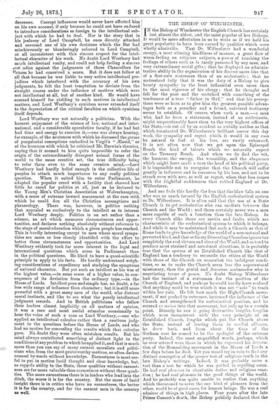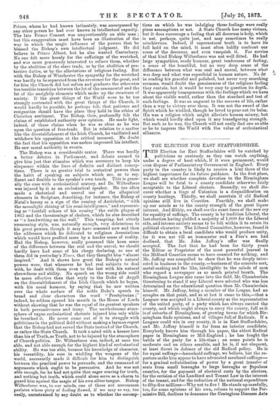THE BISHOP OF WINCHESTER.
IN the Bishop of Winchester the English Church has certainly I lost almost the ablest, and the most popular of her Bishops. It would be mere affectation in us to write as if we held his great popularity to have been earned by qualities which were wholly admirable. That Dr. Wilberforce had a wonderful energy, a most winning kindliness of manner, a great flow of warm feeling on religious subjects, a power of touching the feelings of others such as is rarely possessed by any man, and very extraordinary social gifts ; that he displayed an adminis- trative ability in the organisation of his diocese more like that of a first-rate statesman than of an ecclesiastic ; that he understood fully that it was the duty of a Bishop to give hearty sympathy to the least influential even more than to the most vigorous of his clergy ; that he thought and felt for the poor and the wretched with something of the tenderness of a true " father in God," and that his percep- tions were so keen as to give him the greatest possible advan- tages both as a preacher and a friend, universal testimony seems to establish. Of course, when such a man,—a man who, had he been a statesman, instead of an ecclesiastic, might unquestionably have risen to the very highest offices of the State,—is cut off by an accident so awfully sudden as that which terminated Dr. Wilberforce's brilliant career this day week, the sympathy and regret which it would in any case be natural to feel at his loss, are vastly enhanced. It is not often now that we get upon the Episcopal Bench the kind of talents which we naturally expect on the Treasury Bench. And when we do find the wit, the humour, the energy, the versatility, and the eloquence which might have made a man the head of his political party, it is impossible not to recognise that the Church will suffer greatly in influence and in resources by his loss, and not to be struck even with awe, as well as regret, when that loss comes with the frightful suddenness that robbed England of Dr. Wilberforce.
And one feels this hardly the less that the blow falls on one who was so much formed by the English ecclesiastical system as Dr. Wilberforce. It is often said that the use of a State Church is to get ecclesiastics who can mediate between the Church and the World ; and there certainly never was a man more capable of such a function than the late Bishop. In every Church alike there are merits and faults which are characteristic of the ecclesiastical system to which it belongs. And while it may be maintained that such a Church as that of Rome tends to give knowledge of the world of a non-natural and perverted kind, and that ordinaryDissenting Churches ignore too completely the real virtues and vices of the.World, and so tend to produce most strained and unnatural situations, it is probably true that the system of an Established Church like that of England has a tendency to reconcile the ethics of the World with those of the Church on somewhat too indulgent condi- tions, so as to make the Church seem less the supernatural missionary, than the genial and decorous ambassador who is negotiating terms of peace. No doubt Bishop Wilberforce had the instinct of a statesman for the position of the Church of England, and perhaps he could hardly have realised that anything could be true which it was not " safe " to teach within her pale. He felt how much the High-Church move- ment, if not pushed to extremes, increased the influence of the Church and strengthened its ecclesiastical position, and ho entered ex anima into that movement, but only up to a certain point. Directly he saw it going destructive lengths, lengths which were inconsistent with the very principle of an Established Church, lengths which put the Church above the State, instead of leaving them in cordial alliance, he drew back, and from about the time of the Gorham case he ceased to be the apologist of the extreme party. Indeed, the most unqualified words, perhaps, which he ever uttered were those in which he expressed his detesta- tion of the Romanising movement in the House of Lords a few days before he died. Yet you would try in vain to find any distinct conception of the proper test of religious truth in the late Bishop's writings. Indeed, it was probably more a tact than a test by which he was guided in repelling error. He had real pleasure in charitable duties and religious emo- tion ; he had real pleasure in the good things of the world. And he probably was quite unable to realise that anything which threatened to sever the one kind of pleasure from the other, could be of good omen for human beings. He was a real admirer of things in high places. Four years after the late Prince Consort's death, the Bishop publicly declared that the
Prince, whom he had known intimately, was unsurpassed by any other person he had ever known in intellectual capacity. The late Prince Consort was unquestionably an able man ; but this exaggeration must have been an illustration of the way in which the magic influence of the powers that be biassed the Bishop's own intellectual judgment. He did believe in Prince Albert, but he also wanted Canterbury. No one felt more keenly for the sufferings of the wretched, and was more generously interested to relieve them, whether by the abolition of the slave trade, or by the abolition of pro- tective duties, or by the alleviations of religious feeling. But with the Bishop of Winchester the sympathy for the wretched was hardly to be separated from the reverence for the great, and for him the Church did but soften and graduate the otherwise too terrible transition between the lot of the ornamental and the lot of the unsightly elements which make up the structure of society. If the great things of the World were to be too strongly contrasted with the great things of the Church, it would hardly be possible, he perhaps felt, that patience and resignation should have the place they held in the ethics of Christian sentiment. The Bishop, then, profoundly felt the claims of established authority over opinion. He made light, indeed, of those claims when he was as clear as he was upon the question of free-trade. But in relation to a matter like the disestablishment of the Irish Church, he vacillated and withdrew his opposition at the critical moment. No doubt the fact that his opposition was useless impressed his intellect. He saw moral authority in events.
The Bishop was a considerable orator. There was hardly a better debates in Parliament, and debate seemed to give him just that stimulus which was necessary to keep his eloquence within the lines of definite and distinct concep- tions. There is no greater trial to oratorical powers than the habit of speaking on subjects which are, so to say, fluent and flexible to the speaker's own touch. This is gener- ally the case with ecclesiastical oratory, and Dr. Wilberforce was injured by it as an ecclesiastical speaker. He too often made a rhetorical and unreal use of the allegorical elements in Scripture, describing, for instance, the Bishop of Natal's heresy as a sign of the coming of Antichrist, " with the moonlight shining of his semi-intelligence," and represent- ing as " footfall echoes of his coming " the cattle plague of 1865 and the threatenings of cholera, which he also described as " a handwriting on the wall." This tempting, but utterly unmeaning style, was, naturally enough, very deleterious to his great powers, though it may have seasoned now and then the addresses which he delivered to religious Associations which would have profited more by a harder sense of reality. Had the Bishop, however, really possessed this keen sense of the difference between the real and the unreal, we should hardly have had some of his clergy declaring, as one of them did in yesterday's Times, that they thought him " almost inspired." And it shows how great the Bishop's natural powers were, that whenever he had real subjects to deal with, he dealt with them even to the last with his natural shrewdness and ability. No speech on the wrong side could be more effective than that reply to the Duke of Argyll on the disestablishment of the Irish Church which he began, with his usual humour, by saying that he saw written over the whole surface of the noble Duke's speech in broad and clear characters the word " Presbyterian ;" indeed, he seldom opened his mouth in the House of Lords without showing that he was the equal of its greatest speakers in both persuasiveness and irony. The unwholesome atmo- sphere of vague ecclesiastical rhetoric injured him only while he breathed it. He never came out of it to struggle with politicians in the political field without making a layman regret that the Bishop had not served the State instead of the Church, or rather the State Church. It took a mind with a keener love than his of Truth, as Truth, not to be injured by the atmosphere of Church politics. Dr. Wilberforce was, indeed, at once too able, and not able enough for the highest kind of ecclesiastical ability. He was too able, because his knowledge of character, his versatility, his ease in wielding the weapons of the world, necessarily made it difficult for him to distinguish between the practical power to persuade, and the command of arguments which ought to be persuasive. And he was not able enough, for he had not quite that eager craving for truth, and nothing but truth, which could alone serve as a charm to guard him against the magic of his own silver tongue. Bishop Wilberforce was, to our minds, one of those not uncommon prelates whose piety of feeling flowed, if we may so say, too easily, unrestrained by any doubt as to whether the assump- tions on which he was indulging these feelings were really pious assumptions or not. A State Church has many virtues, but it does encourage a feeling that all decorum is holy, which is not, perhaps, quite just, and may sometimes be really mischievous. Indeed, if supernatural truth is to have its full hold on the mind, it must often boldly confront our sense of the decorous, and even vanquish it. For service of that kind Bishop Wilberforce was not well fitted. He had large sympathies, ready humour, great tenderness of feeling, a sense of the beautiful, but no very deep sense of the difference between what was real and unreal, between what was deep and what was superficial in human nature. No dir in reading his graceful and polished, but never very searching sermons, would doubt the genuineness of the religious feeling they contain, but it would be very easy to question its depth. It was apparently homogeneous with the feelings which we have about the visible world, rather than the standard and test of such feelings. It was an unguent to the sorrows of life, rather than a way to victory over them. It was not the sword of the Spirit which he wielded, though he loved to pour out its balm. His was a religion which might alleviate human misery, but which would hardly shed upon it any transfiguring strength. But such as he was, the Church will not easily find one so able as he to impress the World with the value of ecclesiastical alliances.



































 Previous page
Previous page